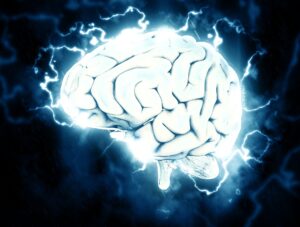Mental health conditions such as anxiety, depression, addiction, and ADHD are complex traits influenced by a combination of genetic and environmental factors. While genetic variation can increase a person’s susceptibility to these conditions, lifestyle, stress, trauma, and other environmental exposures also play a significant role in their development and severity. Understanding both inherited and external influences is key to managing and supporting mental wellbeing.
Fitgenes’ DNA reports can help uncover genetic influences on mental health, supporting more personalised wellbeing strategies. However, it is important to note that Fitgenes genetic results simply indicate a predisposition, and are not intended as a diagnosis of any mental health conditions.

Relevant genes included in Fitgenes reports are:
- IL-6 and TNFA: Cytokine genes involved in the body’s inflammatory response. Chronic low-grade inflammation, influenced by certain variants in these genes, has been associated with higher risk of depression, anxiety, and cognitive decline.
- MAOA: Plays a role in the breakdown of key neurotransmitters such as dopamine, serotonin, and norepinephrine. Variants in this gene can influence emotional regulation, with some associated with increased anger reactivity and others linked to a higher risk of depression.
- MTHFR: Affects folate metabolism and the body’s methylation capacity. Impaired methylation has been associated with altered neurotransmitter synthesis and increased susceptibility to mood disorders such as depression and anxiety.
- MTR: Also involved in the methylation cycle, MTR plays a supporting role in neurotransmitter regulation. While less studied than MTHFR, some evidence suggests that disrupted methylation involving MTR may influence cognitive and emotional function.
- ADORA2A: Influences individual sensitivity to caffeine, with genetic variation linked to increased susceptibility to caffeine-induced anxiety, sleep disturbances, and heightened stress responses.
- Neurotransmitter metabolism and ADHD: Several genes involved in neurotransmitter metabolism, such as COMT, DAO, MAOA, ALDH2, NOS3, and HNMT, have been linked in research to biological pathways relevant to ADHD. Variants in these genes may influence dopamine and other signalling systems that affect attention, executive function, impulsivity, and levels of alertness or mental stimulation, all of which are core components of ADHD-related behaviours.
While these genes represent only part of the overall picture, they can provide valuable insights into the biological processes that may influence emotional functions. By identifying individual genetic differences, we can better understand how people might respond differently to environmental triggers and stressors, enabling more personalised strategies to manage health risks and support overall mental wellbeing.
Fitgenes practitioner-only DNA reports are aimed at identifying genetic predispositions relevant to health and wellbeing, and dietary considerations to improve overall health. These genes mentioned above are not intended to diagnose any mental health condition. Therefore, if diagnosis of any specific mental health condition is the only or main goal of testing, it is probably better to start with a GP or other medical professional and seek referral for an assessment.
Go to our Health and Wellbeing Report page or contact us at enquiries@fitgenes.com for more information or for us to help you locate a Fitgenes Accredited Practitioner.

Article author: Cristina Fortuno, PhD
Dr Fortuno is genetic scientist with focus on human health, and has a PhD (University of Queensland) in Human genetics.
Key References:
Blasco-Fontecilla H, Bella-Fernández M, Wang P, Martin-Moratinos M, Li C. Prevalence and Clinical Picture of Diamine Oxidase Gene Variants in Children and Adolescents with Attention Deficit Hyperactivity Disorder: A Pilot Study. J Clin Med. 2024;13(6):1659. Published 2024 Mar 14. doi:10.3390/jcm13061659
Carthy E, Ellender T. Histamine, Neuroinflammation and Neurodevelopment: A Review. Front Neurosci. 2021;15:680214. Published 2021 Jul 14. doi:10.3389/fnins.2021.680214
Chang J, Jiang T, Shan X, et al. Pro-inflammatory cytokines in stress-induced depression: Novel insights into mechanisms and promising therapeutic strategies. Prog Neuropsychopharmacol Biol Psychiatry. 2024;131:110931. doi:10.1016/j.pnpbp.2023.110931
Comings DE, Gade-Andavolu R, Gonzalez N, et al. Multivariate analysis of associations of 42 genes in ADHD, ODD and conduct disorder. Clin Genet. 2000;58(1):31-40. doi:10.1034/j.1399-0004.2000.580106.x
Fageera W, Chaumette B, Fortier MÈ, et al. Association between COMT methylation and response to treatment in children with ADHD. J Psychiatr Res. 2021;135:86-93. doi:10.1016/j.jpsychires.2021.01.008
Khan S, Naeem A, Fritts A, Cummins M, Kayes C, Fang W. Discovery of Methylenetetrahydrofolate Reductase (MTHFR) Deficiency in Individuals With Common Psychiatric Comorbidities: A Retrospective Case Review. Cureus. 2024;16(4):e58122. Published 2024 Apr 12. doi:10.7759/cureus.58122
Landolt HP. “No thanks, coffee keeps me awake”: individual caffeine sensitivity depends on ADORA2A genotype. Sleep. 2012;35(7):899-900. Published 2012 Jul 1. doi:10.5665/sleep.1942
Mentis AA, Dardiotis E, Katsouni E, Chrousos GP. From warrior genes to translational solutions: novel insights into monoamine oxidases (MAOs) and aggression. Transl Psychiatry. 2021;11(1):130. Published 2021 Feb 18. doi:10.1038/s41398-021-01257-2
Mitchell ES, Conus N, Kaput J. B vitamin polymorphisms and behavior: evidence of associations with neurodevelopment, depression, schizophrenia, bipolar disorder and cognitive decline. Neurosci Biobehav Rev. 2014;47:307-320. doi:10.1016/j.neubiorev.2014.08.006
Sun X, Ming Q, Zhong X, et al. The MAOA Gene Influences the Neural Response to Psychosocial Stress in the Human Brain. Front Behav Neurosci. 2020;14:65. Published 2020 May 15. doi:10.3389/fnbeh.2020.00065


